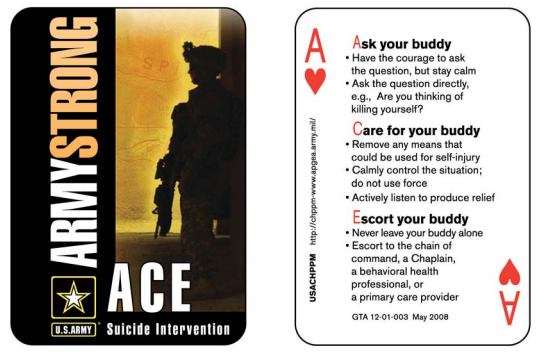In the recent swirl of articles and blogs about the new Presidential policy on honoring those who suicide in combat with a condolence letter, there are some who may be lost: the Families. The controversy seems to be about whether or not you should “honor” the Soldier who died with a letter of condolence. Recently the White House has decided that President Obama should do it, but then only for those who suicided in theater.
What is often forgotten are the families. In my experience, families of suicides are doubly devastated, first by the death and then by the guilt. “How could I have prevented it? What did I do wrong?” They often feel very isolated. Few public condolences. Their loved member is not considered a hero, but, at best, one who did a selfish act, or more often, a disgrace.
In my last blog, I talked of other stigmatizing policies. I did not even mention the one above. But since it has come up, here are a couple of others, relevant to suicide.
In the past, when a Soldier died by suicide, it was up to the local commander as to whether he received a “ramp ceremony”. This is a formal ceremony, where the deceased is loaded onto the ramp of a military plane.
Fortunately, I believe, now the “ramp ceremony” is now standard, due to the Army’s recent review, under the leadership of General Peter Chiarelli, the Vice Chief of Staff. I do not know the policies of the other Services.
Perhaps more importantly, the Army has a procedure of determining whether the death was in the line of duty. In the event of a suicide, a psychiatrist has to opine whether the deceased was “of sound mind”. If yes, no death benefits. If no, if the deceased was “of unsound mind”, then the family can receive the death benefits.
That was a policy I tried mightily to change when I was on active duty. For one thing there is not any clear definition of what is meant by “sound” or “unsound” mind.
I often received appeal packets where the same standards that we use for criminal responsibility are applied to the deceased. Usually I reversed them; for me, Soldiers who suicided were by definition of unsound mind. They were not terminally ill, but in great pain and despair.
For another thing, again, it is about the families. Why should the military deprive the grieving and ashamed families when their loved one took their own life, often related to what they experienced in combat?
Families of those who die by suicide are tormented for years. We have to come up with a better way to console them and to decrease the pain. Whether that is a letter from the Commander in Chief I do not know. But it is a start.



